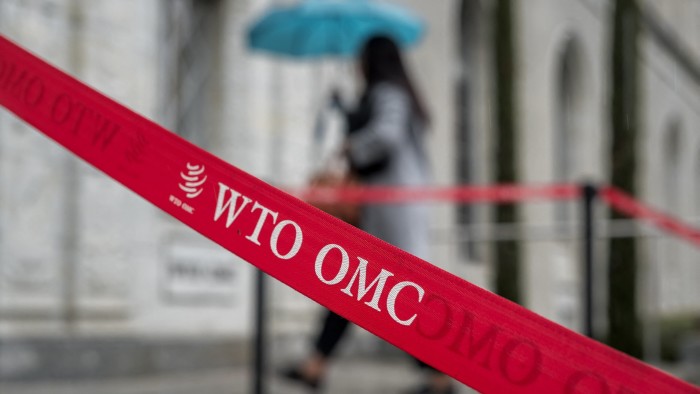Unlock the White House Watch newsletter for free
Your guide to what Trump’s second term means for Washington, business and the world
It is tempting to see Donald Trump and his wrecking policies on trade as a destructive thunderbolt from a clear blue sky. Certainly many of his domestic policies, even compared with his first term, have taken a sharper and more definitive turn towards the extreme.
In the case of trade and globalisation, however, there is perhaps a little more continuity, not just with his first time in office but with previous US administrations. Regardless of whether it was actually reflected in broad US public opinion, there were clear strands of thought in US politics which had already begun to treat trade deals and often trade itself as toxic.
Trump’s tariffs are the most extraordinary act of far-reaching protectionism since at least the Great Depression, but there has been a latent inclination in US politics towards blaming trade for everything that has gone wrong with the US economy and society.
The effect of Trump on the global trading system and particularly multilateral institutions like the World Trade Organization is likely to be profound. The US was instrumental in setting up that system and was traditionally one of its most active users. Its departure from rule-setting, and even more the direct effect of its tariffs and other interventions on world trade, are the system’s biggest test since the Depression.
More on The Future of Global Trade
There are, however, several causes for optimism that Trump’s measures will not prove anything like as destructive as the high US tariffs of the early 1930s which set off a spiral of protectionism. Firstly, no other major economy, including the US’s great commercial rival China, has the same huge political aversion to globalisation. Unlike the 1930s, other economic policy institutions, particularly central banks, have tools to cushion the impact of a trade shock and prevent it from deepening a global recession.
And the lesson of the 35 years since the post-cold war wave of globalisation took off is that actual trade — not just cross-border movement of goods, but also of services, foreign direct investment, capital, people and data — has proved resilient to a whole variety of shocks.
While Trump’s disdain for the WTO and the system it represents are dramatic, it also remains the case that the US’s attachment to it was always somewhat transactional. When the WTO was created in 1995 out of the more informal General Agreement on Tariffs and Trade (Gatt), there was suspicion in Washington right from the beginning that it was creating a system of supranational law which would reduce the US’s sovereignty.
In particular, although the US was an active user of the WTO’s dispute resolution system and won many cases, there was resentment particularly on Capitol Hill over rulings that seemed to interfere with the US’s right to tax and its ability to deal with unfair trade practices as it saw fit. Once the negotiating function of the WTO seized up in the 2000s — it has never completed a broad and deep multilateral agreement — the US became increasingly disillusioned.
It was Trump’s first administration that froze the dispute resolution system by refusing to approve new judges. But his successor Joe Biden thereafter continued the same policy, his administration insisting that it would be willing to unfreeze the mechanism only if the rest of the WTO’s membership would agree to changes that other countries said it never properly got around to articulating.
Today, the WTO still struggles to conclude large-scale binding agreements, even among a subset of membership — in part due to India’s obstructionism, driven by its own institutional grievances and political calculus. Still, a coalition including the EU, China and Japan has created a workaround dispute mechanism to keep things moving.
The same kind of pragmatism might well save global trade itself as well as its formal mechanisms of governance. Doomsters have been talking for a long time about the global trading system splitting into geopolitical blocs, perhaps two centred on the US and China or three if there is also a grouping led by the EU. There has certainly been some movement in that direction, according to studies by the WTO and the IMF.
The first Trump administration put hefty tariffs on China, which certainly diminished bilateral trade between the two. But the IMF has also talked about the emergence of “connector countries”, especially emerging markets such as Vietnam and Mexico, which managed to trade with both the US and China.
The Biden administration made more subtle and targeted attempts to pull other economies, particularly its foreign policy allies, out of China’s economic and technological orbit, especially in areas like electric vehicles.
But even its supposed close allies such as the EU preferred to operate in both the US and Chinese orbits. The Trump administration’s attempts to force countries to cut China off as the price of reducing threatened tariffs is similarly unlikely to work.
The threat from Trump to world trade is undoubtedly the greatest since the second world war. But assuming that the US’s tariff pathology is also infecting the rest of the world looks like a mistake.
Trade Secrets
Alan Beattie writes the Trade Secrets newsletter. Premium subscribers can sign up here to get the newsletter delivered every Monday.



